SOC10236 Ethical Analysis: Media's Violation of Celebrity Privacy
VerifiedAdded on 2022/07/29
|6
|1062
|23
Report
AI Summary
This report presents an ethical analysis of the media's violation of celebrity privacy, addressing the ethical question of whether the media violates the right to privacy of celebrities. The analysis identifies the central act as the media publicizing private information. It examines relevant virtues like respect and confidentiality, and explores the media's actions within the context of freedom of the press. The report argues that media actions often violate these virtues, driven by publicity and financial gain. It then delves into the ethical frameworks of Kantian ethics and utilitarianism, concluding that the media's actions are unethical based on Kant's principles. The report contrasts the two ethical approaches, with the author leaning towards Kant's theory, which prioritizes intentions over consequences. The analysis emphasizes the self-contradictory nature of the media's actions and their implications for the rights of celebrities, drawing from provided bibliography.
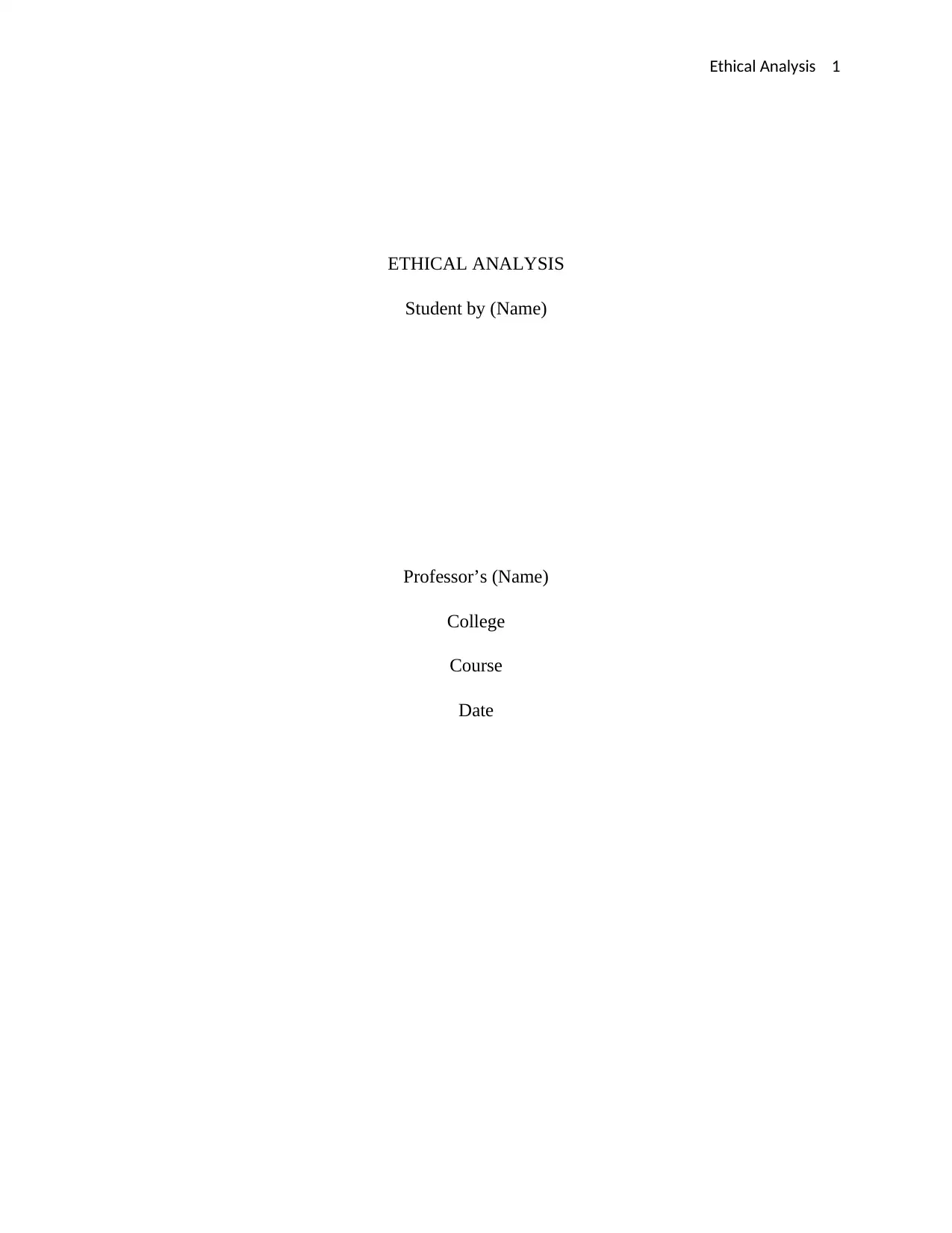
Ethical Analysis 1
ETHICAL ANALYSIS
Student by (Name)
Professor’s (Name)
College
Course
Date
ETHICAL ANALYSIS
Student by (Name)
Professor’s (Name)
College
Course
Date
Paraphrase This Document
Need a fresh take? Get an instant paraphrase of this document with our AI Paraphraser
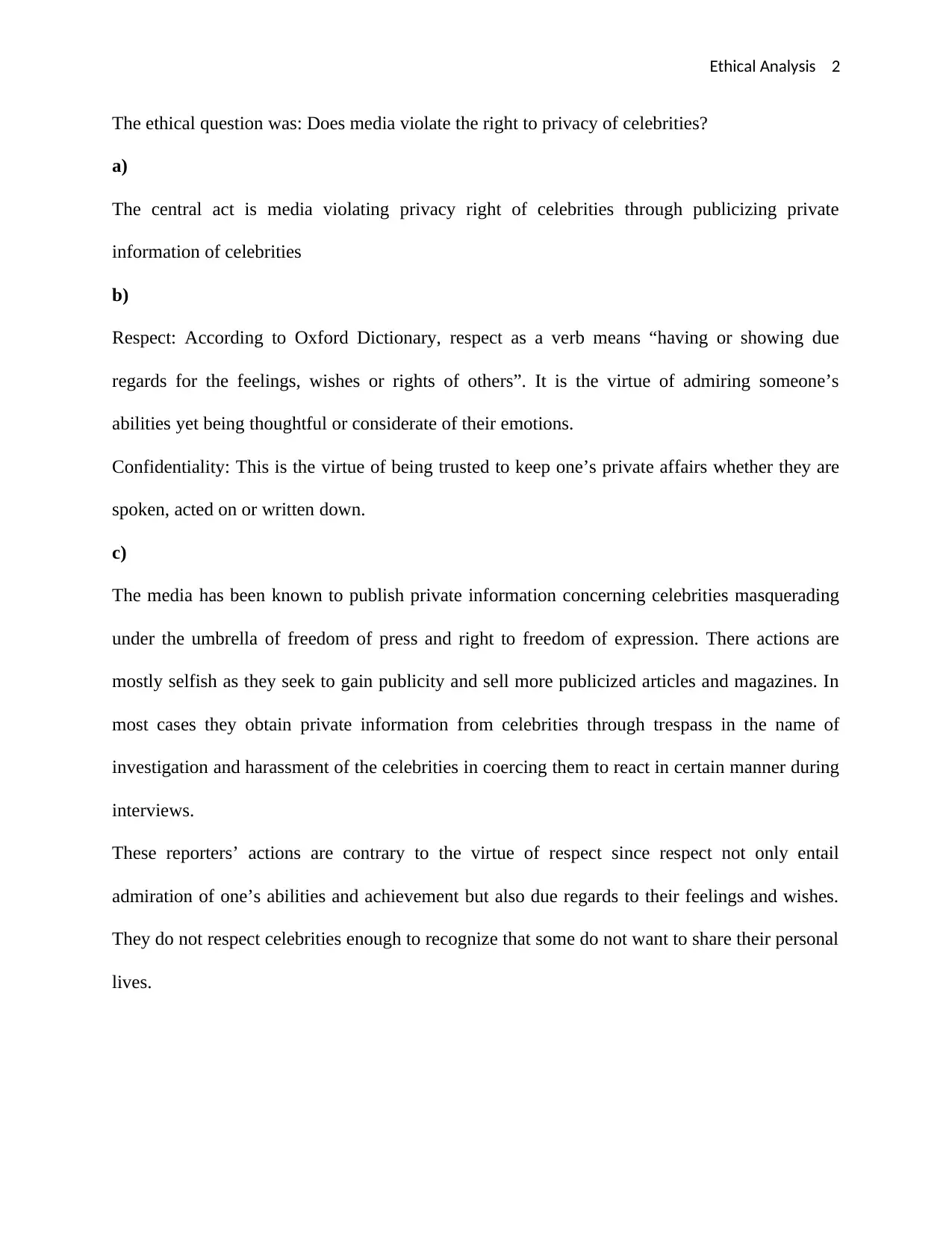
Ethical Analysis 2
The ethical question was: Does media violate the right to privacy of celebrities?
a)
The central act is media violating privacy right of celebrities through publicizing private
information of celebrities
b)
Respect: According to Oxford Dictionary, respect as a verb means “having or showing due
regards for the feelings, wishes or rights of others”. It is the virtue of admiring someone’s
abilities yet being thoughtful or considerate of their emotions.
Confidentiality: This is the virtue of being trusted to keep one’s private affairs whether they are
spoken, acted on or written down.
c)
The media has been known to publish private information concerning celebrities masquerading
under the umbrella of freedom of press and right to freedom of expression. There actions are
mostly selfish as they seek to gain publicity and sell more publicized articles and magazines. In
most cases they obtain private information from celebrities through trespass in the name of
investigation and harassment of the celebrities in coercing them to react in certain manner during
interviews.
These reporters’ actions are contrary to the virtue of respect since respect not only entail
admiration of one’s abilities and achievement but also due regards to their feelings and wishes.
They do not respect celebrities enough to recognize that some do not want to share their personal
lives.
The ethical question was: Does media violate the right to privacy of celebrities?
a)
The central act is media violating privacy right of celebrities through publicizing private
information of celebrities
b)
Respect: According to Oxford Dictionary, respect as a verb means “having or showing due
regards for the feelings, wishes or rights of others”. It is the virtue of admiring someone’s
abilities yet being thoughtful or considerate of their emotions.
Confidentiality: This is the virtue of being trusted to keep one’s private affairs whether they are
spoken, acted on or written down.
c)
The media has been known to publish private information concerning celebrities masquerading
under the umbrella of freedom of press and right to freedom of expression. There actions are
mostly selfish as they seek to gain publicity and sell more publicized articles and magazines. In
most cases they obtain private information from celebrities through trespass in the name of
investigation and harassment of the celebrities in coercing them to react in certain manner during
interviews.
These reporters’ actions are contrary to the virtue of respect since respect not only entail
admiration of one’s abilities and achievement but also due regards to their feelings and wishes.
They do not respect celebrities enough to recognize that some do not want to share their personal
lives.
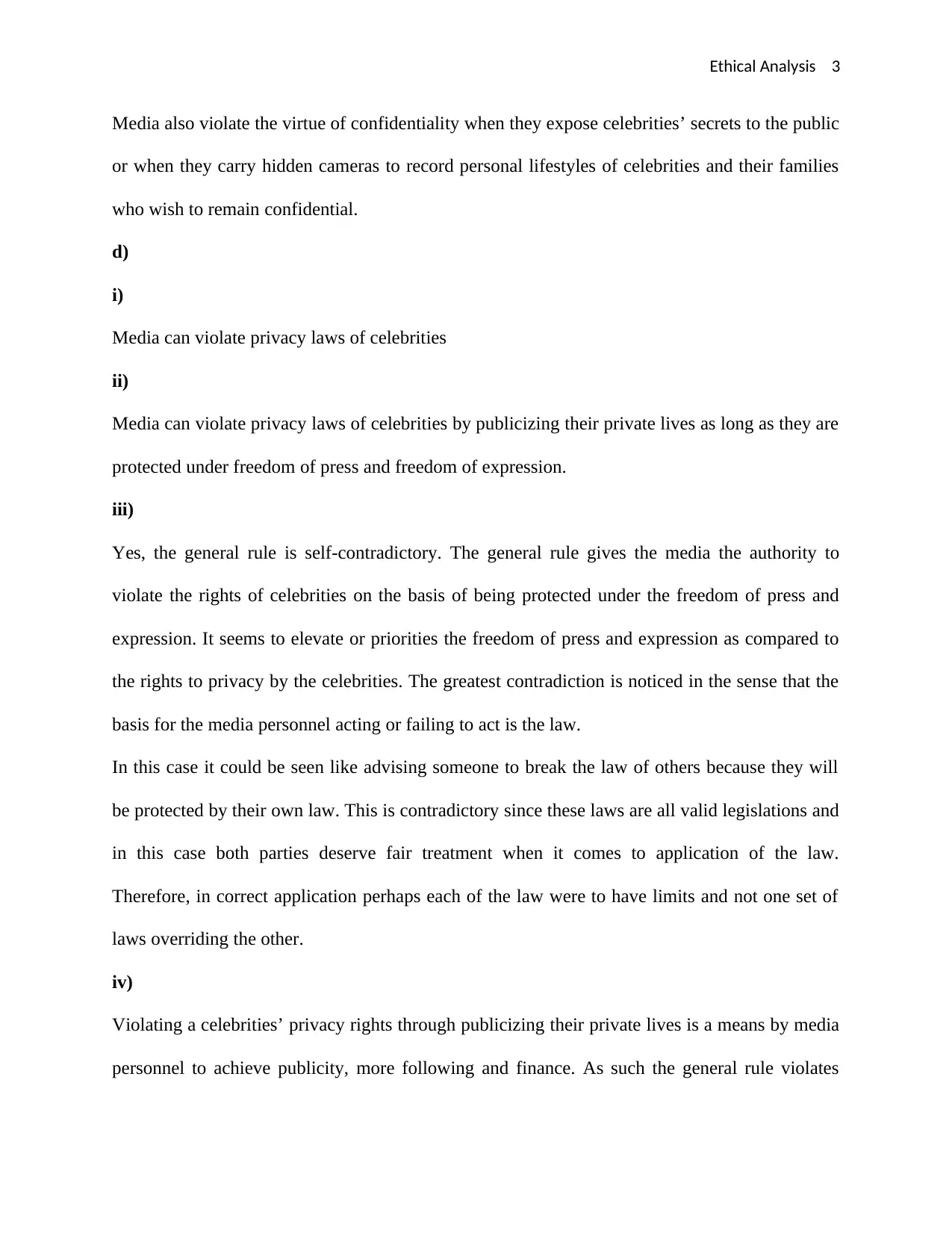
Ethical Analysis 3
Media also violate the virtue of confidentiality when they expose celebrities’ secrets to the public
or when they carry hidden cameras to record personal lifestyles of celebrities and their families
who wish to remain confidential.
d)
i)
Media can violate privacy laws of celebrities
ii)
Media can violate privacy laws of celebrities by publicizing their private lives as long as they are
protected under freedom of press and freedom of expression.
iii)
Yes, the general rule is self-contradictory. The general rule gives the media the authority to
violate the rights of celebrities on the basis of being protected under the freedom of press and
expression. It seems to elevate or priorities the freedom of press and expression as compared to
the rights to privacy by the celebrities. The greatest contradiction is noticed in the sense that the
basis for the media personnel acting or failing to act is the law.
In this case it could be seen like advising someone to break the law of others because they will
be protected by their own law. This is contradictory since these laws are all valid legislations and
in this case both parties deserve fair treatment when it comes to application of the law.
Therefore, in correct application perhaps each of the law were to have limits and not one set of
laws overriding the other.
iv)
Violating a celebrities’ privacy rights through publicizing their private lives is a means by media
personnel to achieve publicity, more following and finance. As such the general rule violates
Media also violate the virtue of confidentiality when they expose celebrities’ secrets to the public
or when they carry hidden cameras to record personal lifestyles of celebrities and their families
who wish to remain confidential.
d)
i)
Media can violate privacy laws of celebrities
ii)
Media can violate privacy laws of celebrities by publicizing their private lives as long as they are
protected under freedom of press and freedom of expression.
iii)
Yes, the general rule is self-contradictory. The general rule gives the media the authority to
violate the rights of celebrities on the basis of being protected under the freedom of press and
expression. It seems to elevate or priorities the freedom of press and expression as compared to
the rights to privacy by the celebrities. The greatest contradiction is noticed in the sense that the
basis for the media personnel acting or failing to act is the law.
In this case it could be seen like advising someone to break the law of others because they will
be protected by their own law. This is contradictory since these laws are all valid legislations and
in this case both parties deserve fair treatment when it comes to application of the law.
Therefore, in correct application perhaps each of the law were to have limits and not one set of
laws overriding the other.
iv)
Violating a celebrities’ privacy rights through publicizing their private lives is a means by media
personnel to achieve publicity, more following and finance. As such the general rule violates
⊘ This is a preview!⊘
Do you want full access?
Subscribe today to unlock all pages.

Trusted by 1+ million students worldwide
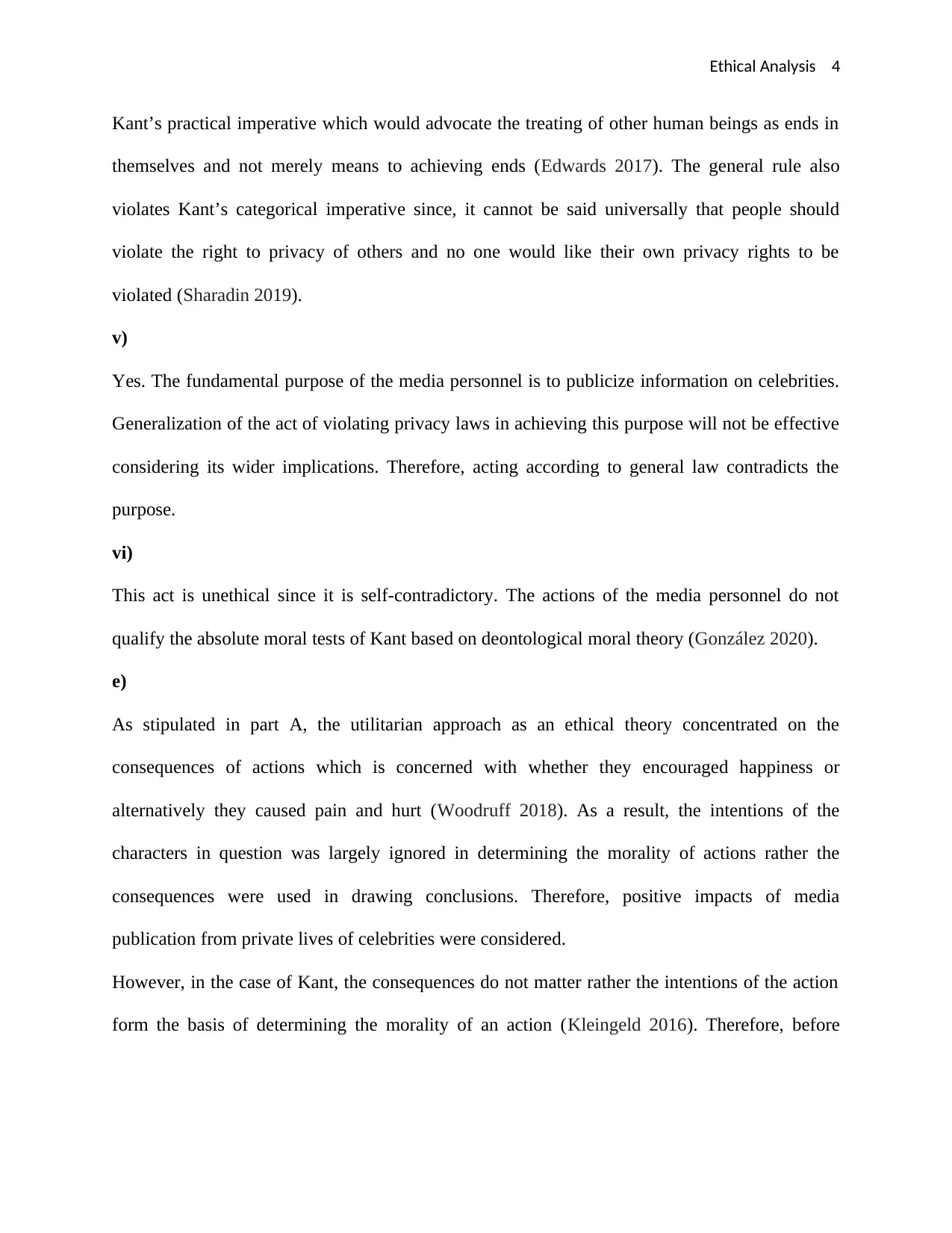
Ethical Analysis 4
Kant’s practical imperative which would advocate the treating of other human beings as ends in
themselves and not merely means to achieving ends (Edwards 2017). The general rule also
violates Kant’s categorical imperative since, it cannot be said universally that people should
violate the right to privacy of others and no one would like their own privacy rights to be
violated (Sharadin 2019).
v)
Yes. The fundamental purpose of the media personnel is to publicize information on celebrities.
Generalization of the act of violating privacy laws in achieving this purpose will not be effective
considering its wider implications. Therefore, acting according to general law contradicts the
purpose.
vi)
This act is unethical since it is self-contradictory. The actions of the media personnel do not
qualify the absolute moral tests of Kant based on deontological moral theory (González 2020).
e)
As stipulated in part A, the utilitarian approach as an ethical theory concentrated on the
consequences of actions which is concerned with whether they encouraged happiness or
alternatively they caused pain and hurt (Woodruff 2018). As a result, the intentions of the
characters in question was largely ignored in determining the morality of actions rather the
consequences were used in drawing conclusions. Therefore, positive impacts of media
publication from private lives of celebrities were considered.
However, in the case of Kant, the consequences do not matter rather the intentions of the action
form the basis of determining the morality of an action (Kleingeld 2016). Therefore, before
Kant’s practical imperative which would advocate the treating of other human beings as ends in
themselves and not merely means to achieving ends (Edwards 2017). The general rule also
violates Kant’s categorical imperative since, it cannot be said universally that people should
violate the right to privacy of others and no one would like their own privacy rights to be
violated (Sharadin 2019).
v)
Yes. The fundamental purpose of the media personnel is to publicize information on celebrities.
Generalization of the act of violating privacy laws in achieving this purpose will not be effective
considering its wider implications. Therefore, acting according to general law contradicts the
purpose.
vi)
This act is unethical since it is self-contradictory. The actions of the media personnel do not
qualify the absolute moral tests of Kant based on deontological moral theory (González 2020).
e)
As stipulated in part A, the utilitarian approach as an ethical theory concentrated on the
consequences of actions which is concerned with whether they encouraged happiness or
alternatively they caused pain and hurt (Woodruff 2018). As a result, the intentions of the
characters in question was largely ignored in determining the morality of actions rather the
consequences were used in drawing conclusions. Therefore, positive impacts of media
publication from private lives of celebrities were considered.
However, in the case of Kant, the consequences do not matter rather the intentions of the action
form the basis of determining the morality of an action (Kleingeld 2016). Therefore, before
Paraphrase This Document
Need a fresh take? Get an instant paraphrase of this document with our AI Paraphraser
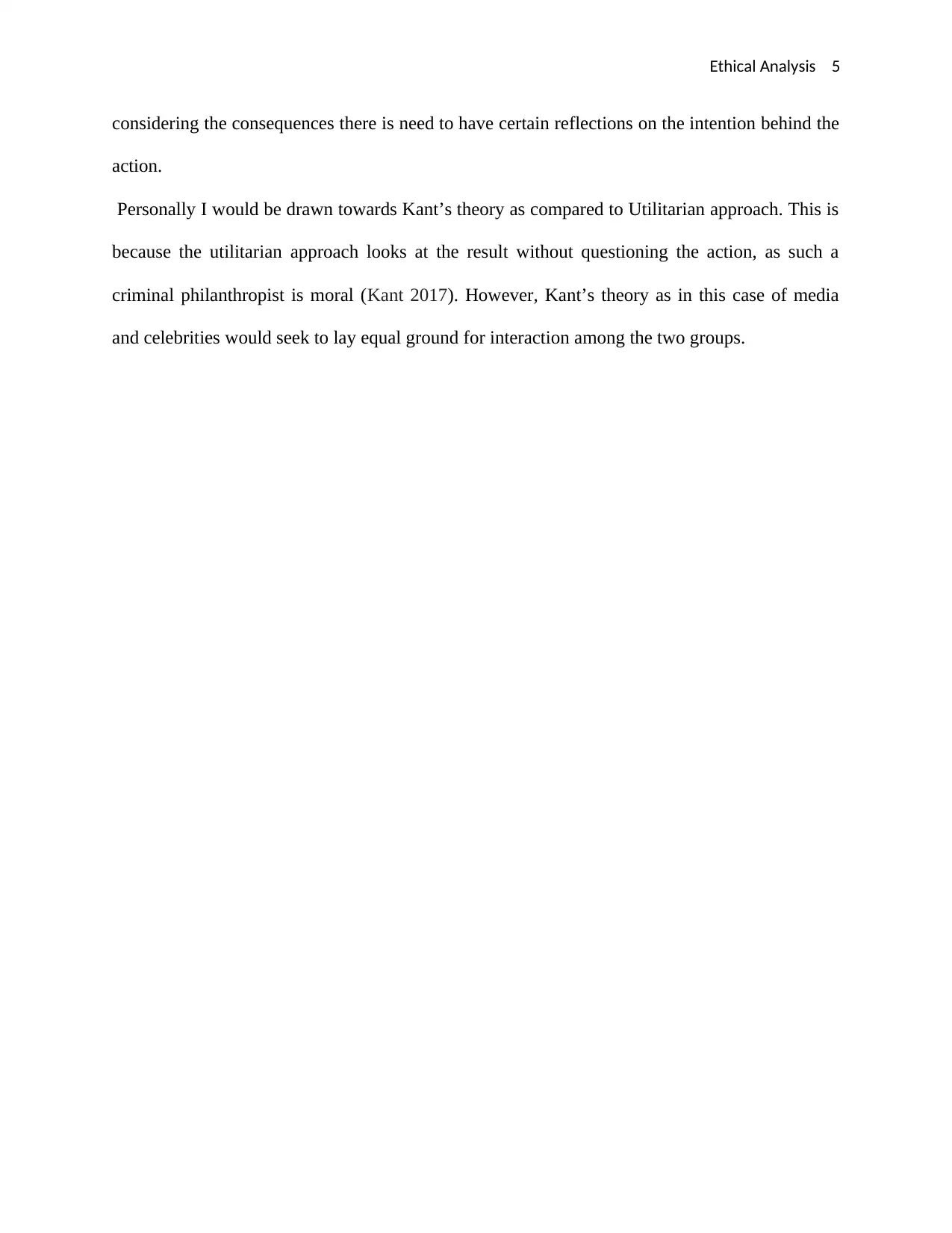
Ethical Analysis 5
considering the consequences there is need to have certain reflections on the intention behind the
action.
Personally I would be drawn towards Kant’s theory as compared to Utilitarian approach. This is
because the utilitarian approach looks at the result without questioning the action, as such a
criminal philanthropist is moral (Kant 2017). However, Kant’s theory as in this case of media
and celebrities would seek to lay equal ground for interaction among the two groups.
considering the consequences there is need to have certain reflections on the intention behind the
action.
Personally I would be drawn towards Kant’s theory as compared to Utilitarian approach. This is
because the utilitarian approach looks at the result without questioning the action, as such a
criminal philanthropist is moral (Kant 2017). However, Kant’s theory as in this case of media
and celebrities would seek to lay equal ground for interaction among the two groups.
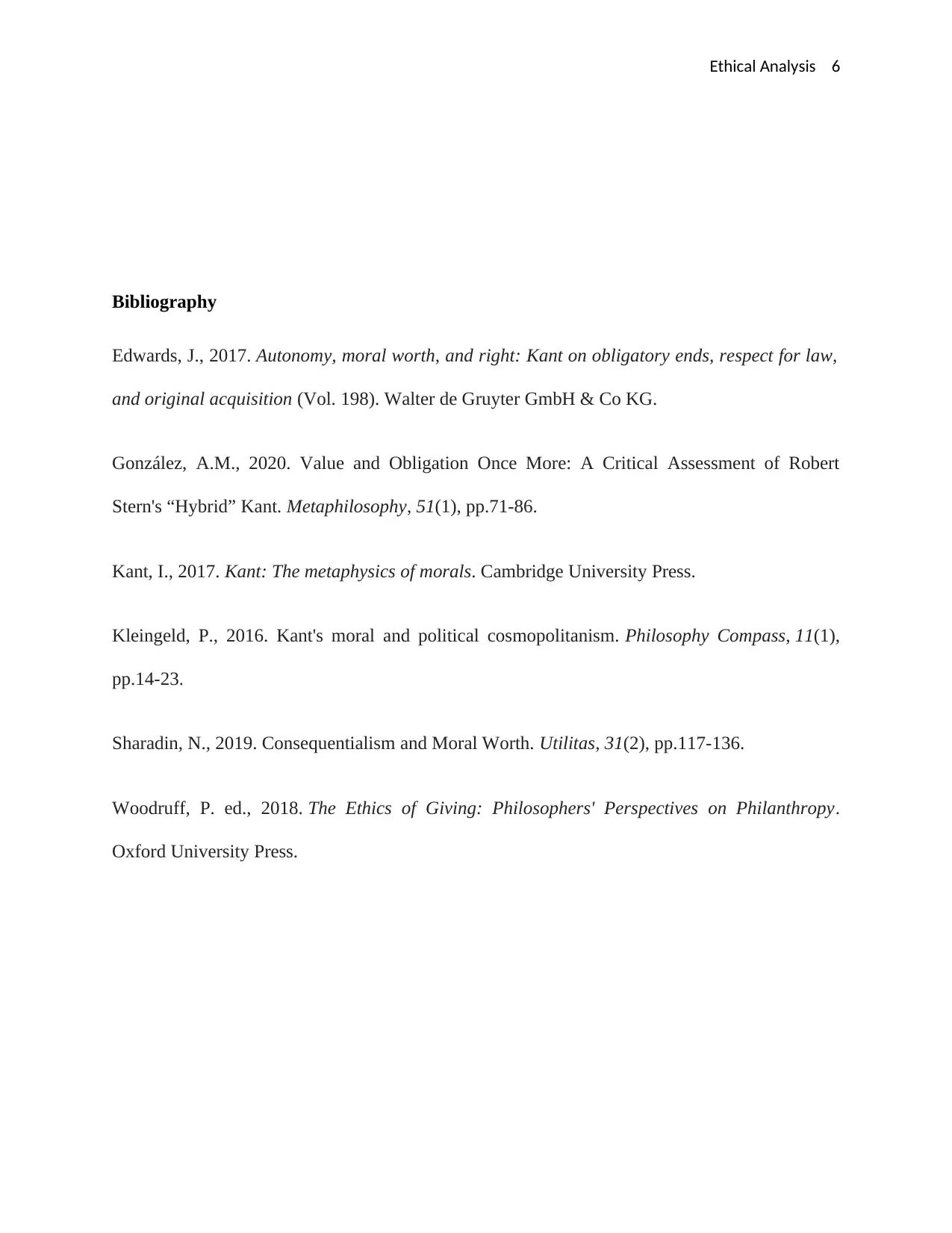
Ethical Analysis 6
Bibliography
Edwards, J., 2017. Autonomy, moral worth, and right: Kant on obligatory ends, respect for law,
and original acquisition (Vol. 198). Walter de Gruyter GmbH & Co KG.
González, A.M., 2020. Value and Obligation Once More: A Critical Assessment of Robert
Stern's “Hybrid” Kant. Metaphilosophy, 51(1), pp.71-86.
Kant, I., 2017. Kant: The metaphysics of morals. Cambridge University Press.
Kleingeld, P., 2016. Kant's moral and political cosmopolitanism. Philosophy Compass, 11(1),
pp.14-23.
Sharadin, N., 2019. Consequentialism and Moral Worth. Utilitas, 31(2), pp.117-136.
Woodruff, P. ed., 2018. The Ethics of Giving: Philosophers' Perspectives on Philanthropy.
Oxford University Press.
Bibliography
Edwards, J., 2017. Autonomy, moral worth, and right: Kant on obligatory ends, respect for law,
and original acquisition (Vol. 198). Walter de Gruyter GmbH & Co KG.
González, A.M., 2020. Value and Obligation Once More: A Critical Assessment of Robert
Stern's “Hybrid” Kant. Metaphilosophy, 51(1), pp.71-86.
Kant, I., 2017. Kant: The metaphysics of morals. Cambridge University Press.
Kleingeld, P., 2016. Kant's moral and political cosmopolitanism. Philosophy Compass, 11(1),
pp.14-23.
Sharadin, N., 2019. Consequentialism and Moral Worth. Utilitas, 31(2), pp.117-136.
Woodruff, P. ed., 2018. The Ethics of Giving: Philosophers' Perspectives on Philanthropy.
Oxford University Press.
⊘ This is a preview!⊘
Do you want full access?
Subscribe today to unlock all pages.

Trusted by 1+ million students worldwide
1 out of 6
Related Documents
Your All-in-One AI-Powered Toolkit for Academic Success.
+13062052269
info@desklib.com
Available 24*7 on WhatsApp / Email
![[object Object]](/_next/static/media/star-bottom.7253800d.svg)
Unlock your academic potential
Copyright © 2020–2026 A2Z Services. All Rights Reserved. Developed and managed by ZUCOL.





